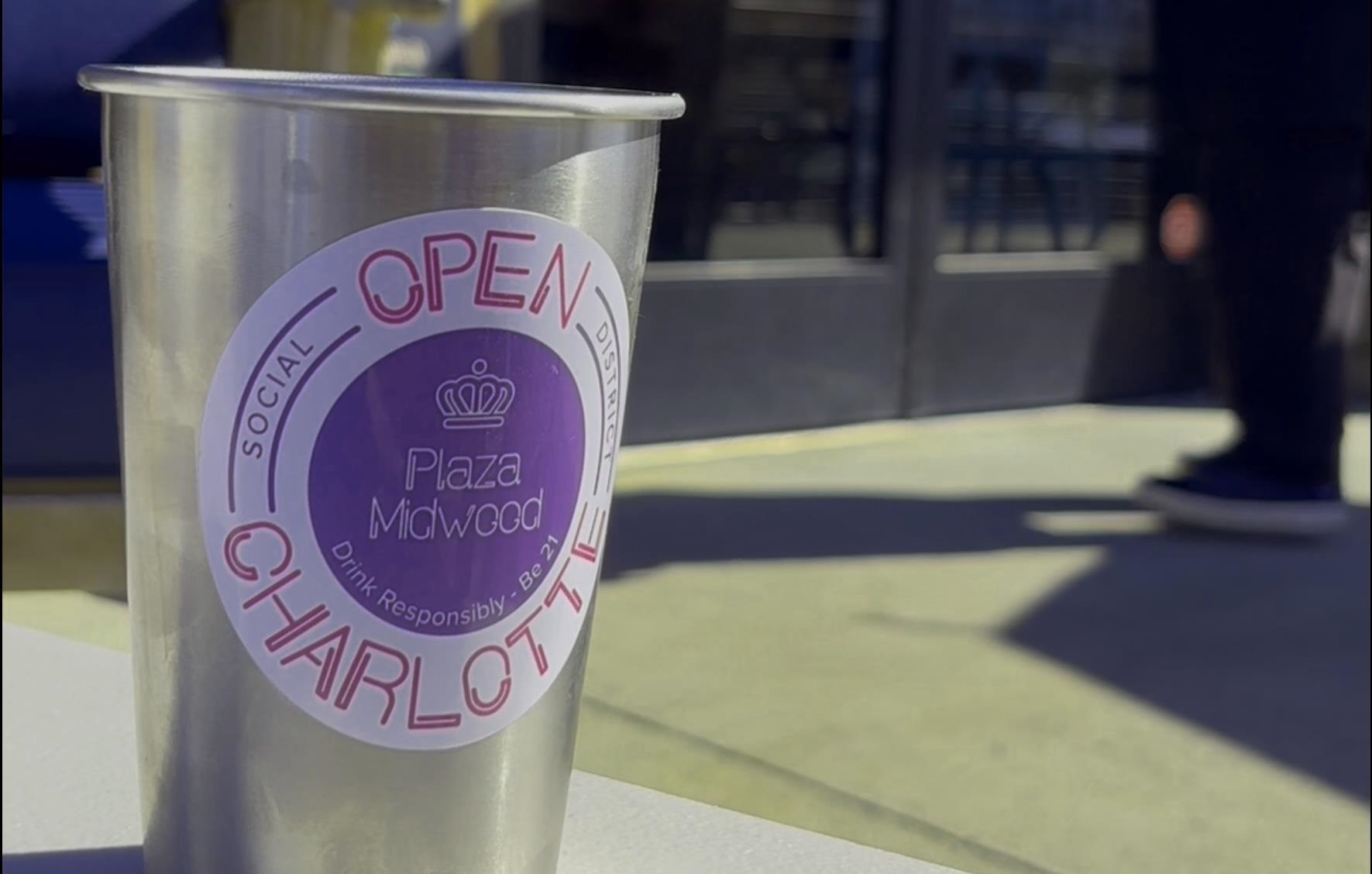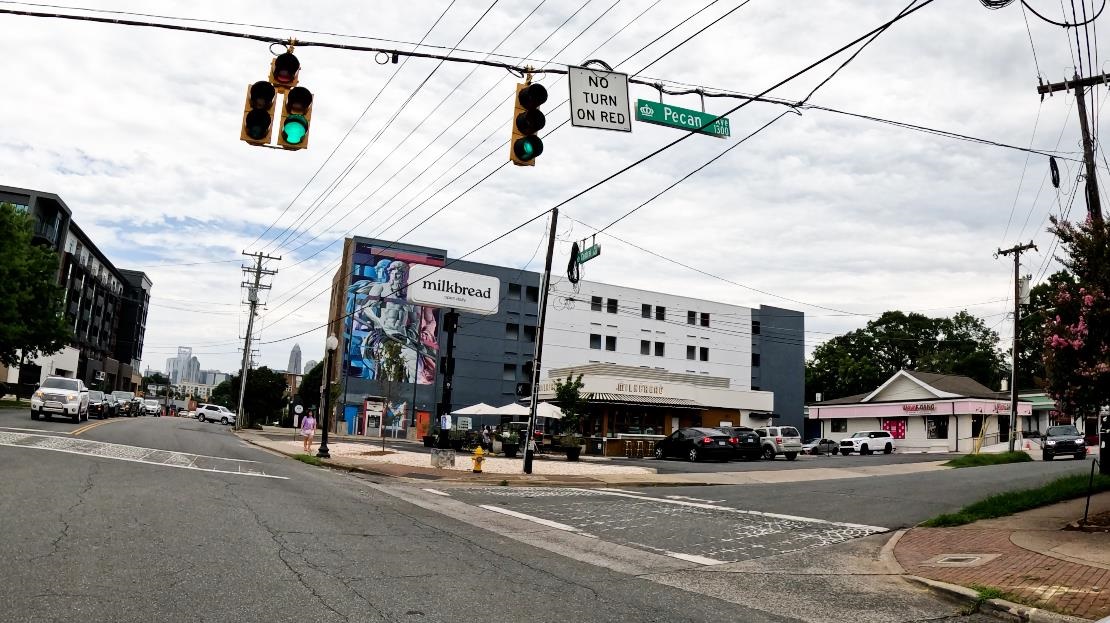One Year Later, Plaza Midwood Social District Makes Impact
Published on March 03, 2025

Two people cheers with the stainless steel Plaza Midwood social district cups.
As cities evolve, so do the ways we engage with our communities. A little more than a year ago, carrying a drink from a brewery to a restaurant a quarter mile down the street seemed like just an idea. Drinks stayed restricted to the small lots or patios of the businesses that sold them. That changed March 2024. Plaza Midwood slowly and quietly rolled out the city’s first social district and invited people to sip and walk through the neighborhood. Now, a year later, it’s making an impact.
How the Social District Came to Be
Before discussing the success of the program, let’s go back to see how we got here. A social district is a designated area where open to-go containers filled with alcohol are allowed in the street. In 2021, Governor Roy Cooper signed a law permitting cities and counties to pass ordinances to create social districts. In August of the following year, Charlotte City Council approved an ordinance to let neighborhoods submit applications.
By late 2023, Plaza Midwood became the first area to apply. The application was a lengthy one with the city creating a 15-step process to be considered. The Plaza Midwood Merchants Association (PMMA) did the heavy lifting. The group established standards like hours of operation, who could sell alcohol, and where the district would be established. PMMA asked Envision Charlotte to design a 16-ounce stainless steel cup for businesses to sell as to-go containers. Stickers were handed out to participating businesses, and by March 2024, Plaza Midwood was raising a glass, or rather those stainless steel cups, to their district debut. The rules were simply: purchase a cup, get it filled it up, and enjoy your drink on-the-go.

Plaza Midwood Social District 16-ounce stainless steel cup.
From Concern to Connection
The initial rollout was intentionally slow. When the social district was first proposed, many were concerned Central Avenue would start to look like Bourbon Street. PMMA’s Executive Director, Jason Michel, remained confident that the district would not only be embraced but would also offer responsible enjoyment. The association wanted this experience to be an amenity to an area with a strong entrepreneurial spirit.
“The goal was to launch responsibly, sustainably, and not have drinking be the focus,” Michel explained.
He said, as the year unfolded, it was clear PMMA’s vision became a reality. The district had turned into an expansive outdoor space allowing people to move from one spot to the next with a drink in hand. “It’s kind of turned the area into a very fun patio,” Michel stated.
What he thinks is most important about the success of the social district is its unifying element. Not being confined to a single location is a community gamechanger. Michel said it brings people out in a different way than before. This simple act of walking, talking, and drinking fosters a unique sense of togetherness. “You find yourself having 10-to-15-minute conversations with people on Thomas and Central because they are out with their cups and you’re out with your cup and you just strike up a conversation,” he noted.

Milkbread is a participating business in the Plaza Midwood social district.
Building Through Collaboration
For many business owners, the social district has created new opportunities for engagement. Rachael Hudson, co-owner of Pilot Brewing, explains that while they saw an increase in business during the warmer months, the impact has been particularly significant during weekends when more people are out and about. Hudson explained this year has been dedicated to understanding how the program could work for them.
“It's ran by a group of volunteers so everyone is doing the best they can,” she said. “I definitely see it as a benefit, and I wouldn't want to not have it.”
The overall sense of camaraderie among the businesses is undeniable. Hudson said the five breweries in the area were already close, but this has become a win for all of them. This addition means the businesses tapped into a new customer base. For one, Hudson said the neighborhood’s walkability encourages a self-guided brewery bar hop. Also, since Plaza Midwood is the first, it grants them a unique edge.
“It has made us stand out from other neighborhoods, which is a huge benefit,” Hudson shared.
Economic Gains
Michel highlights that the social district’s impact can be partially measured by cups sold. Since its start, people purchased over 3,600 cups. This generated about $28,000 in revenue. This number doesn’t account for situations like people reusing the cups or spending money inside stores that don’t sell alcohol but do allow it inside.
“It has been validating and wonderful to see the community embrace it in an energetic way,” Michel remarked.
Hudson reiterated that same message. Pilot Brewing has sold 189 cups in a year. She said drinks went inside those cups, which are extra sales. Employees at Pilot see people bringing cups back all the time for refills and exchanges, which also accounts for extra money coming through the door. While she said the financial impact may not be as tangible as looking in her books and seeing increased numbers, she does see people using the resource.
“I feel like it's a slow growth but it's fun and people do like it when they come down here or hear about it,” she said.
The Future of Social Districts
Looking ahead, both Michel and Hudson remain optimistic about the long-term impact of the social district. With new businesses, green spaces, and more events on the horizon, Michel says it’s clear the district will continue to be a strong part of the community. Hudson looks forward to seeing how the brewery can stretch the program in the new year to see what it can really be capable of.
The big question for the future is, will we see other social districts? Michel says others have reached out with questions on how it’s worked. He added his encouragement for other neighborhoods to explore the possibility of creating their own social districts. In his opinion, the lessons learned from Plaza Midwood’s success can be applied to other communities, especially those that already have a strong business base and an engaged population.
“I can't say enough how fun it has been to have your entire neighborhood be just an outdoor space,” he exclaimed.

Burial Beer is a participating business in the Plaza Midwood social district.
To see a list of businesses participating in the Plaza Midwood social district, find it on the Plaza Midwood neighborhood page. These businesses are up-to-date as of our March 3 posting. If you have any questions about social districts or want to get up-to-date information about Charlotte's social district, find more on the city's social district page.